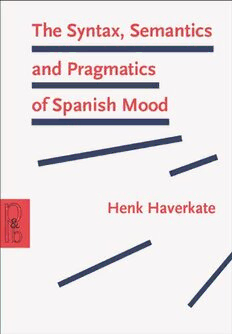
The Syntax, Semantics and Pragmatics of Spanish Mood PDF
248 Pages·2004·0.813 MB·English
Most books are stored in the elastic cloud where traffic is expensive. For this reason, we have a limit on daily download.
Preview The Syntax, Semantics and Pragmatics of Spanish Mood
Description:
This study provides a consistent description and explanation of the syntax, the semantics and the pragmatics of Spanish mood. A major focus of attention is the central role of the truthfunctional categories of realis, potentialis and irrealis as parameters relevant to mood selection in both subordinate and non-subordinate clauses. Furthermore, a proposal is offered for a new typology of clause-embedding predicates. The framework chosen stems from the insight that complement-taking predicates share the property of providing information on the set of mental processes which characterize intentional human behaviour. At the level of pragmatic analysis, mood selection is examined from a variety of angles. Thus, specific research is conducted within the framework of speech act theory, relevance theory, politeness theory and the theory of Gricean maxims.
See more
The list of books you might like
Most books are stored in the elastic cloud where traffic is expensive. For this reason, we have a limit on daily download.
